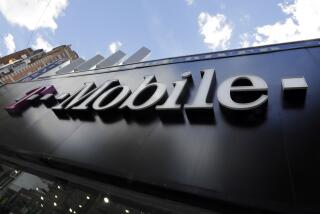Small-Town Utilities Fear Losses of Global Proportion
For more than a century, Crown Point Telephone Corp. has had few problems serving its tiny Adirondack Mountains community in upstate New York. But owner Pat Knapp now worries that her 1,100 customers might see rate hikes if network developer Global Crossing Ltd., which filed for bankruptcy protection in January, doesnât pay its bills in the coming months.
Half a country away, Jerry Melick, general manager of Liberty Communications in tiny West Liberty, Iowa, also is feeling the pinch. And he is deeply concerned about the fate of the stateâs 150 independent phone companies as regulators investigate accounting practices at major carriers to see whether they artificially pumped up revenue.
There are about 1,200 of these small utilities nationwide that provide the critical last link from the vast phone infrastructure to the homes and businesses of customers. Many derive a significant amount of their annual revenue from big telecoms by allowing traffic to run over their lines.
âGlobal Crossing is not going to put us out of business, but the trend is disturbing,â said Melick, whose family has owned Liberty for four generations. âHow many inflated deals are out there? Is it all a house of cards?â
Federal investigations of the accounting practices of Global Crossing, Qwest Communications International Inc. and WorldCom Inc. have local exchange carriers on edge, ready to fight any attempt to foist long-distance losses onto their customers.
Global alone pays $2 billion a year to local phone companies in access charges, mainly to complete calls that its business customers make worldwide. About $1.7 billion of that is spent in the U.S., with about 80% going to AT&T; Corp., Qwest, WorldCom and five other major carriers.
Although the big companies can absorb what for them are tiny losses--BellSouth Telecommunications Inc., with $29 billion in annual revenue, is setting aside a reserve against the $52 million that Global owes it--many of the independent exchanges across the country are hurting.
âIt means we canât do certain things this year that we would have hoped to do,â said Richard M. Vohs, president of Iowa Network Services, a company owned by 128 local carriers to coordinate long-distance calls. The companyâs 200 employees could see a drop of as much as 2% in their profit-sharing checks because of losses from Global. âAnd it was no fault of the employees,â Vohs said.
In Globalâs bankruptcy case, the company said it had an excellent payment record before its Chapter 11 filing and has sufficient funds--$700 million in unrestricted cash--to pay for goods and services it has been ordering since it filed its petition Jan. 28.
In the coming days, as February bills come due, utilities will find out whether Global can make good on its promises to pay.
Unlike most vendors, who can cut off sales if a customer fails to pay new bills, utility companies by law must continue to provide services without much assurance they will be repaid fully. Even if bills arenât paid, hundreds of utilities involved in the case may be required to continue providing services for up to 60 more days.
For a small rural utility in Crown Point, a sleepy town on the southwestern shores of Lake Champlain just north of Ticonderoga, the unpaid debts are a burden for the Knappsâ family-run enterprise. Globalâs monthly bills of about $1,500 are about 5% of Crown Point Telephoneâs total monthly revenue, Knapp said. Thatâs $18,000 a year, income the local exchange canât afford to lose.
Global has not paid its bills for December and January, which are part of the bankruptcy petition. And the February bill, which is not part of the bankruptcy and must be paid, is due in a week, Knapp said.
âWe really canât do anything but wait,â she said. âWe have to provide service.â
A bankruptcy judge in New York has rejected motions by utilities to force Global to set aside two monthsâ worth of billings as assurance they will be paid for continued services. But the judge shortened to two weeks the time Global has to pay its utility bills, and he set up procedures to deal quickly with late payments and to seek a cut-off of service for nonpayment.
Knapp, Melick and even the big carriers donât feel reassured. In a court filing, Citizens Communications Co., which bought the local operations of Frontier Telephone of Rochester Inc. from Global, said Globalâs claim to an excellent payment history is âuntrue.â Of the $11.6 million Global owed at the time it filed for bankruptcy protection, $3.4 million was a month late and an additional $2.8 million was overdue by two months or more.
If Crown Point doesnât get paid for âa few more months,â Knapp said, it may ask state regulators for a rate hike; customers now pay $8.79 a month for basic service. âItâs a rural area, so we donât have the panoply of services that we can use to spread the losses out,â she said.
Small Companies Pay a Price in Time, Legal Fees
The town of 2,500 on the eastern edge of the state has little in the way of business. NoTECO Inc., a one-man inventor, designs roof rakes and bicycle seat posts, boasting that its products are âwell behind the times.â And there are home-based operations, including Adirondac Hands and History craft items and Raffertyâs American Bulldogs breeding outfit.
Most people work at the International Paper Co. plant in Ticonderoga, eight miles to the south, where a Wal-Mart built three years ago is the closest thing the area has to a shopping mall.
With 15 workers, Crown Point Telephone is the biggest employer in town next to the school system. It started, then sold, a cellular business, and it brought in high-speed lines. It created an Internet subsidiary with three employees.
So far, Globalâs financial problems havenât forced a change in Crown Point operations, but they have taken up more of Knappâs time and are costing the exchange about $1,500 a month in added legal fees.
Knapp said she worries that the situation could get worse if another major carrier files for bankruptcy protection.
âIt seems like the whole industry is wobbly right now,â she said.
From Melickâs view in the gently rolling land of eastern Iowa, companies such as Global and Qwest arenât keeping a handle on the profit structure. Long-distance carriers gripe about paying access fees, but Melick said such fees are a lot cheaper than building a new network or buying all the local companies.
Besides, Iowa phone companies have made it easy: They built a modern fiber-optic network linking each company to a terminal in Des Moines, where Iowa Network Services can connect them to any long-distance carrier that comes to the state capital.
Liberty Faces Prospect of Cutting Operations
The network has spurred growth in high-speed and Internet services, but as Melick deadpans, Liberty Communications has enjoyed âsingle-digit growthâ since his great-grandfather bought the company in 1908. It has 4,200 lines serving about 3,900 customers in West Liberty and nearby West Branch, birthplace of President Herbert Hoover.
West Liberty, about 115 miles east of Des Moines, was built at the junction of the east-west and north-south routes of the old Rock Island Railroad, and its past role as a major depot made it more prosperous than other communities. But AT&T; and its Bell operations had a stranglehold on local and long-distance calling until its breakup in the mid-1980s, Melick said, and his grandfather had to sell electrical appliances and teach cooking classes in his basement to make ends meet.
Today, the trains pass without stopping, and the depot has been turned into a museum and headquarters for the local chamber of commerce. Liberty Communications is thriving, though, in a state that regulates the rates of only the three major telephone companies.
Access fees account for 60% of Libertyâs revenue, and Globalâs average monthly bill of $3,500 is about 1% of total revenue, Melick said. At the time it filed its bankruptcy petition, Global owed Liberty about $7,000, an amount, he said, that âmakes you stand up and take notice.â
Should Global fail to make payments over the next several months, Liberty would start looking at cutting operations. Its small size allows it to draw up a contingency plan in a flash.
âWeâre always spending so much on new equipment and laying cable. That would be our first cut before looking at staff cuts or anything else,â Melick said. âAnd if it gets that bad, weâd be leaning on [national trade groups] to find out why this is all being laid on local customers.â
One group of local Iowa exchanges already has taken action. OmniTel Communications Inc. in Nora Springs (halfway between Des Moines and Minneapolis) and 12 other independents canceled a contract with a long-distance company that used Global Crossing as its underlying carrier.
OmniTel, with 6,000 lines serving 5,500 customers, had been billing Global about $63,000 a month in access charges for both incoming and outgoing long-distance calls. Global now owes $120,000--about 17% of OmniTelâs total monthly income--said OmniTelâs CEO, Ronald Laudner Jr.
By going with a different long-distance carrier for outgoing calls, OmniTel has reduced its potential losses by nearly $38,000 a month, Laudner said. The company canât stop incoming callers from using Global lines.
Vohs said Global Crossingâs bankruptcy filing isnât the only failure that has hurt the industry--âIt was just the largest.â Companies such as Internet service provider PSINet Inc., which filed for bankruptcy protection lastJune, have played havoc with the revenues of local utilities. And he said heâs worried that the carnage isnât over.
âWe started a new budget line this year for reserves against these kinds of losses. Weâre setting aside several hundred thousand dollars in reserves now,â Vohs said. âJust so weâre prepared for the possibility that weâll lose more revenue in the future.â
More to Read
Inside the business of entertainment
The Wide Shot brings you news, analysis and insights on everything from streaming wars to production â and what it all means for the future.
You may occasionally receive promotional content from the Los Angeles Times.










